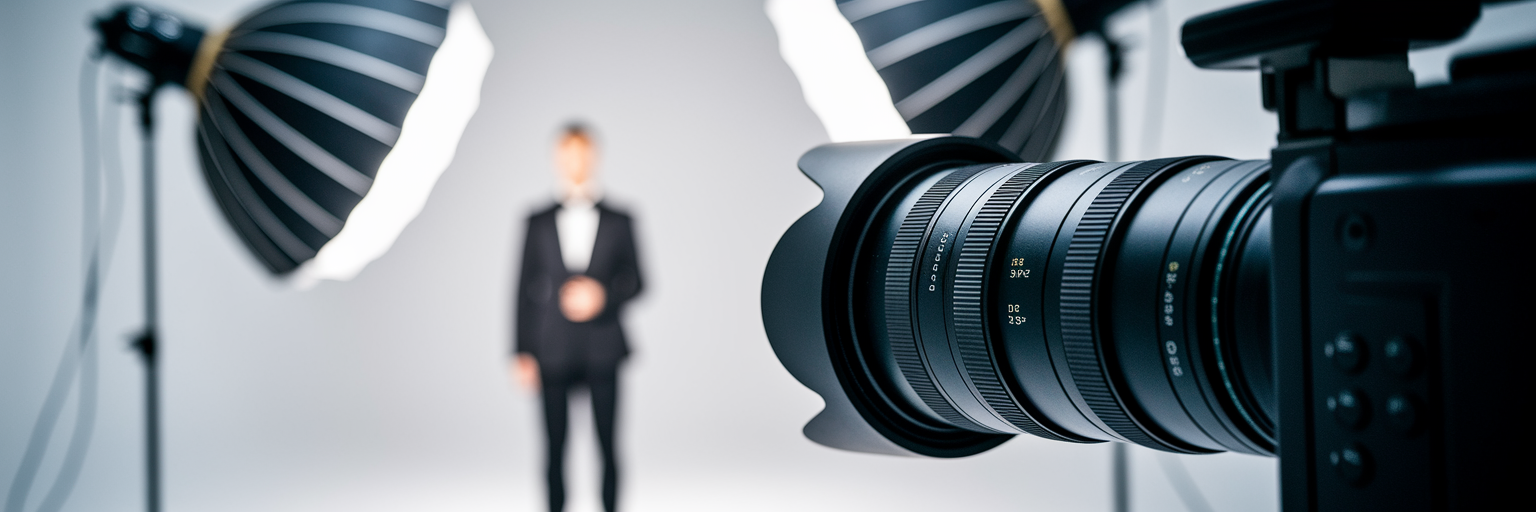The Strategic Importance of Your Professional Headshot
In a professional world where your LinkedIn profile often precedes your handshake, your headshot is your first introduction. It’s no longer just a photo but a primary tool for personal branding. It sets expectations before a single word is exchanged. The core trend for 2025 is clear: authenticity supported by technical excellence. According to a report on professional headshot trends from Lasting Images, the most effective images feel natural and unforced while maintaining high quality.
This is where effective personal branding photography comes into play. It’s about intentionally crafting an image that communicates your professional identity. A deeper look into personal branding reveals that every choice, from your expression to the background, sends a message. The visual language required for a corporate lawyer aiming to project stability is fundamentally different from that of a graphic designer who must communicate innovation and flair. Understanding this distinction is the first step in choosing a headshot that works for you, not against you.
Defining the Polished Corporate Headshot
For those in fields like finance, law, or corporate management, the headshot must project confidence, trustworthiness, and approachability. The modern corporate look has moved away from the stiff, overly formal portraits of the past. Instead, it focuses on a clean, professional aesthetic that feels both authoritative and human. The goal is to build immediate trust with clients, partners, and colleagues.
The background should be simple and non-distracting. Neutral tones like soft grey, white, or a subtly blurred office environment work best. As noted in an analysis by Zesty Orange Photography, clean, minimalist backgrounds keep the focus entirely on the individual. Lighting should be soft and directional to create a warm, flattering look without harsh shadows. For attire, think business professional or smart casual in solid, muted colors that complement your skin tone. This is especially important for corporate headshots for LinkedIn, where your image appears next to your professional history. To see what this looks like in practice, you can explore more examples in our collection of business headshots.
| Element | Best Practices (Do) | Common Pitfalls (Don't) |
|---|---|---|
| Background | Neutral, uncluttered (grey, white, blurred office) | Busy, distracting, or overly casual settings |
| Lighting | Soft, directional, flattering | Harsh, flat lighting that creates shadows |
| Attire | Solid, muted colors; business professional | Loud patterns, logos, or wrinkled clothing |
| Expression | Confident, approachable, natural smile | Stiff, forced, or overly serious |
| Posing | Relaxed shoulders, open body language | Crossed arms, slouching, or awkward angles |
Embracing the Expressive Creative Headshot

If the corporate headshot is about fitting a professional standard, the creative headshot is about showcasing what makes you unique. For professionals in graphic design, marketing, the arts, or other innovative fields, your photo is an extension of your portfolio. It must communicate personality, originality, and artistic flair. These creative industry headshots are your chance to make a memorable statement before a potential client ever sees your work.
Here, the rules are meant to be bent. Instead of neutral backdrops, you can use bold colors, interesting textures, or environmental settings that hint at your craft, like a design studio or an art gallery. Your clothing should reflect your personal style; don't be afraid of color or unique accessories that tell a story. Lighting can be more experimental to create mood or drama. Most importantly, your pose and expression should feel authentic and energetic. The goal is to capture a sense of innovation, not just a static image. Adopting poses that feel natural is key, and you can find inspiration in our guide on posing tips.
- Dynamic Backgrounds: Use bold colors, interesting textures, or environmental settings that hint at your craft (e.g., a design studio, an art gallery).
- Expressive Attire: Choose clothing that reflects your personal style and brand. Don't be afraid of color or unique accessories.
- Creative Lighting: Experiment with lighting to create mood, drama, or visual interest that standard corporate shots avoid.
- Authentic Posing: Adopt poses that feel natural and energetic. The goal is to capture a sense of innovation and personality, not just a static image.
Blending Styles for Modern Hybrid Professions
But what about the roles that sit between these two worlds? Many professionals, from tech entrepreneurs to marketing directors, need to project both credibility and innovation. A FinTech founder, for example, must appear trustworthy to investors while also signaling a forward-thinking culture to attract top engineering talent. For these hybrid professions, a strictly corporate or purely creative headshot might miss the mark. The solution is to consciously blend elements from both styles.
This could mean pairing a professional blazer with a more relaxed, genuine smile, or using a clean, corporate-style background with a single pop of color in your attire. The key is to be intentional. Answering a few questions can provide clarity on how to choose a headshot that strikes the right balance. Articulating this can be challenging, which is why our personal brand statement tool can help clarify your message before your photoshoot.
- What is my company's culture? Is it a formal corporation, a fast-paced startup, or somewhere in between?
- Who is my primary audience? Am I trying to connect with conservative clients, attract bold investors, or recruit innovative talent?
- What are the core attributes of my personal brand? Do I want to be seen as trustworthy, innovative, approachable, or authoritative?
- Where will this headshot be used most often? The tone for a LinkedIn profile might differ from a speaker bio at a creative conference.
Universal Elements of a High-Impact Headshot

Regardless of whether your style leans corporate or creative, some elements are non-negotiable for all professional headshot styles. These fundamentals ensure your photo makes the right impact across all platforms. A guide from Sam Headshots on 2025 trends reinforces this, emphasizing that technical quality and natural aesthetics are universally important. These foundational headshot tips for professionals are what separate a good photo from a great one.
To ensure your headshot is effective, focus on these universal truths. Getting them right is crucial, and to see what to avoid, it can be helpful to review these seven common headshot mistakes.
- High Resolution: Your image must be sharp and clear, whether viewed on a phone or a large monitor. A pixelated photo suggests a lack of attention to detail.
- Authentic Retouching: Editing should enhance the photo by correcting lighting or minor blemishes, not create an artificial or airbrushed look that erases your character.
- Genuine Expression: A relaxed, authentic smile or a confident, engaging look connects far more effectively than a forced expression. People connect with people, not poses.
- Visual Consistency: Your headshot should align with your overall personal brand, creating a cohesive identity across your LinkedIn profile, website, and other professional materials.
Aligning Your Image with Your Career Goals
Ultimately, your headshot is more than just a picture; it's a strategic tool for your career. We've seen the difference between polished corporate photos that build trust and expressive creative portraits that showcase personality. The common thread is authenticity. The most powerful headshot is one that accurately reflects who you are and what you represent professionally.
As you select your style, think beyond your current role. Ask yourself: does my headshot reflect where I am now, or where I want to go? Your professional image should support your ambitions. Fortunately, getting a high-quality, industry-appropriate headshot is more accessible than ever. Modern technologies have removed the traditional barriers of cost and time, empowering you to take control of your professional image with solutions designed for professionals like you.


